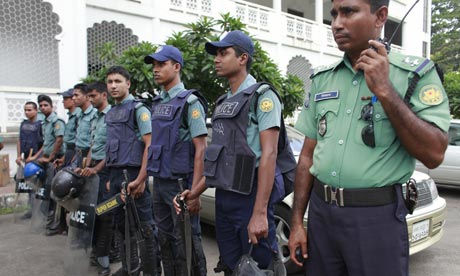
By: Saad Hammadi
Source: http://www.theguardian.com/
The largest Islamist party in Bangladesh has been banned from taking part in the forthcoming general election on the grounds that it is against secularism.
Jamaat-e-Islami (JI) is a key member of an alliance of opposition parties that will seek to oust the ruling Awami League at the polls later this year. Although popular support for the party is limited, its supporters can swing the result in scores of constituencies.
The ruling by the high court in Dhaka on Thursday will raise tensions, already high after months of rival protests and strikes.
A Human Rights Watch report accuses security forces of using excessive force against the demonstrations. At least 150 protesters have been killed and 2,000 injured since February.
While large numbers of protesters have been arrested, the Bangladeshi authorities have made no meaningful efforts to hold members of the security forces accountable, the report says.
Brad Adams, Asia director at Human Rights Watch, said street protests were likely to be more frequent in the coming months. “The risk of further violence is high … unless the government takes firm action to rein in the security forces, there is going to be a lot more blood on the streets before the year is over,” he said.
Many of the protests have been prompted by a series of judgments by a tribunal sentencing senior JI officials to death or life imprisonment for crimes they are alleged to have committed during Bangladesh’s war of independence from Pakistan in 1971. JI opposed the split with Pakistan.
Thursday’s high court ruling comes four years after a group of former politicians and moderate Muslim leaders filed a petition seeking to cancel JI’s registration with Bangladesh’s electoral authorities, saying the party wanted to introduce sharia law in the Muslim-majority country.
Syed Tayabul Bashar, of the Bangladesh Tariqat Federation, said: “We are very happy with the verdict today. Jamaat Islami has no democratic right in this country because its actions in the liberation war were against our country.”
The move will be seen as a political manoeuvre by the government designed to eliminate a key ally of the main opposition party, the Bangladesh National party.
Mahbubul Alam Hanif, joint secretary general of the Awami League, said JI was “no longer a political group, but just a criminal front”.
The justice minister, Shafique Ahmed, said the law was taking its course. “The rule of law demands that nobody is above law. The judgment has been delivered as per the law and the constitution. If they have any grievance they can appeal,” he said.
Abdur Razzaq, assistant secretary general of JI and its chief defence counsel, said the party would seek a stay of the high court decision from the supreme court. “Even if there is an election soon, I would assume that JI would be able to participate,” he said.
There are fears the continuing political violence will cause problems for Bangladesh’s booming garments trade, which employs around three million people. In April 1,129 workers were killed when a factory on the outskirts of Dhaka collapsed. Its clients included many western retailers.
This week employees of a factory north of Dhaka were reported to have set their workplace alight in protest at poor pay.



